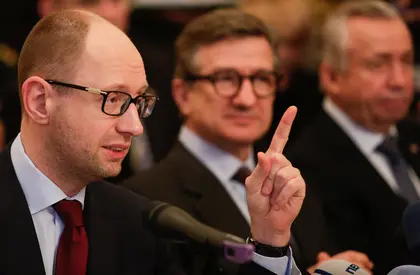Referring to himself as a “crisis manager,” Donetsk Governor Serhiy Taruta proposed that the Cabinet of Ministers approve a development program for the industrial Donbass region – constituting Donetsk, Luhansk and Kharkiv oblasts. He submitted a proposal during the meeting. If enacted, Taruta sid the program “would in three to four months quell the desire of people wanting to join Russia.”
On April 6, pro-Russian demonstrators seized the regional government headquarters of Donetsk and have barricaded themselves inside while declaring an independent republic consisting of Donetsk Oblast, where 10 percent of Ukraine’s population lives.
JOIN US ON TELEGRAM
Follow our coverage of the war on the @Kyivpost_official.
As in Luhansk and Kharkiv, they want Russian to become an official language and are calling for more autonomy from Kyiv. Some also want to join the Russian Federation.
Taruta, a multi-millionaire industrialist, proposed an eight bullet-point plan for the region that emphasizes decentralization as a way to arm him with tools to “fight poverty, corruption, support small and medium-sized businesses, revive industrial production, and develop civil society.”

Photo by Kostyantyn Chernichkin
“In four months, the program will change the attitude of residents,” he said inside the Donetsk Chamber of Commerce.
In an indirect reference to the government buildings occupied in Luhansk and Donetsk, Taruta implied giving them prosecutorial immunity if they vacate them and surrender their weapons “because the law should be applied equally – you can’t interpret the law in one place and differently in another place.”
Ukraine’s richest billionaire Rinat Akhmetov told Yatseniuk that the “voice of Donbass wants to be heard…in short they want a better life.” He said negotiations would de-escalate the situation in Donetsk and “the people of Donbass must be the beneficiaries of these negotiations.”
Those present emphasized that decentralization of power was the only way forward, not federalization, as the Kremlin has proposed.
“Federalization and decentralization are two different recipes,” said Ukraine’s Regional Development Minister Volodymyr Groisman, the former mayor of Vinnytsia in central Ukraine. “We should give local governments more power to set educational and cultural policy, to run their utilities and govern by consensus of decisions on the ground.”
He added that the central government in these matters would serve in a role of observing and controlling that laws are properly carried out.
Kharkiv Mayor Hennadiy Kernes was blunter.
“You must take into consideration all the specific features of each local region and give us the opportunity to serve the people,” he said.
Luhansk and Donetsk mayors Serhiy Kravchenko and Oleksandr Lukyanchenko, respectively, called on Yatsenyuk to give their cities more powers to handle issues on the ground.
“If you don’t get a boycott of the (May 25) presidential election, then amend the constitution to allow us to have local referendums,” said Lukyanchenko.
Kravchenko added: “The Russian language needs to be given official status nationwide…we need to preserve our nation-state.”

Photo by Kostyantyn Chernichkin
In response, Yatsenyuk said that a new constitution that increases local governance and legislation that provides for local referendums should be passed by parliament.
“We need to reach this first stage before May 25…we need to have the new Ukrainian constitution submitted for review to the Venice Commission before that,” Yatsenyuk said.
Kyiv Post editor Mark Rachkevych can be reached at [email protected]
Editor’s Note: This article has been produced with support from the project www.mymedia.org.ua, financially supported by the Ministry of Foreign Affairs of Denmark, and implemented by a joint venture between NIRAS and BBC Media Action.The content in this article may not necessarily reflect the views of the Danish government, NIRAS and BBC Action Media.
You can also highlight the text and press Ctrl + Enter




